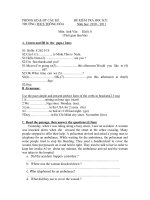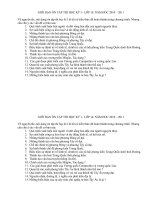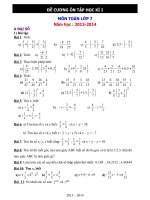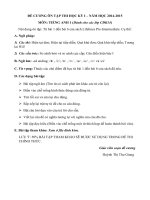Ôn tập thi học ky i anh văn 10
Bạn đang xem bản rút gọn của tài liệu. Xem và tải ngay bản đầy đủ của tài liệu tại đây (115.51 KB, 7 trang )
REVISION FOR THE FIRST TERM ENGLISH 10
I. Pronunciation
1. A. hockey
B. grey
C. they
D. survey
2. A. paper
B. famous
C. rain
D. channel
3. A. wild
B. try
C. mystery
D. violent
4. A. enjoy
B. taught
C. thought
D. saw
5. A. find
B. will
C. child
d. film
6. A. apply
B. fly
C. daily
D. reply
6. A. how
B. allow
C. now
D. know
7. A. dinner
B. drink
C. river
D. child
8. A. cow
B. town
C. how
D. bowl
9. A. play
B. today
C. radio
D. family
10. A. time
B. type
C. they
D. height
11. A. newspaper
B. boy
C. toy
D. enjoy
12. A. noise
B. enjoy
C. destroy D. your
13. A. cow
B. note
C. house
D. mouse
14. A. out
B. bone
C. phone
D. close
15. A. coat
B. couch
C. how
D. town
16. A. found
B. our
C. mouse
D. snow
17. A. town
B. cow
C. snow
D. brown
18. A. around
B. mouse
C. count
D. country
19. A. famous
B. nervous
C. dangerous
D. mountain
II. Tenses
1. “Ann is in hospital.” “Yes, I know. I………………………(visit) her tomorrow.”
2. “We ……………………….(have) a party on Sunday, 12th November. Can you
come?” “Yes, I’d love to.”
3. “Look at those dark clouds!” “Yes, It looks like it…………………………….(rain)”.
4. So far this week there …………………..(be) three burglaries in our street.
5. Yesterday, I (go)………………….to the restaurant with a client.
6. When we (arrive) …………….. at the restaurant, he was having dinner with
his girl friend.
7. I (not go) …………….. to school last Sunday.
8. She (get) …………….. married last year.
9. What …………..you (do)……………. last night? - I (do) ……………..my
homework.
10. Yesterday, I (get) …………… up at 6 and (have) ……. breakfast at 6.30.
11. Last summer I (visit)……………….. Ngoc Son Temple in Ha Noi.
12. John and his father (build) ……………….the cabin themselves last year.
13. She (not /watch)………………………………TV last night
14. They (meet)…………………their friends at the movie theater last week.
15. They (buy)…………………a new car two days ago.
16. My father (work)…………….for Vinamilk company from 1997 to 2010.
17. The pupils (do) ......................................... exercises every morning.
18. The Earth (circle) ....................................... the sun once every 365 days.
19. I (know) ......................................... him for 2 years.
20. My mother (work)………………..as a nurse for a long time.
21. I (just/ finish ) ......................................... my homework.
22. They (not/ meet) ......................................... their friends yet.
23. He (not receive) ...................... any letters from his parents since last year.
24. He has bought some bricks and he (build) ..................................... a garage.
25. Tom (not eat)……………………………….. Chinese food before.
26. How long ………………… you(live) ………………….. here?
27. We (be)……………………….close friends since we (be) ………………..students at
high school.
28. Mr. Tam (teach)………………..English at this school since he (graduate)
…………….in 2003.
29. Jack (leave)……………………….for London a few days ago.
30. Lan and Minh (live)………………….in Ho Chi Minh City since 2001.
31. Mary and Peter (quarrel)…………………..with each other some time ago.
32. The house is very dirty. We (not clean)………………for ages.
33. We (not have)………………………a good meal for months.
34. The weather (be)…………………………..nice since Christmas.
35. They (know)…………………………each other for a long time.
36. They first (meet)…………………a long time ago.
37. We (arrive)…………………..home ten minutes ago.
REVISION FOR THE FIRST TERM ENGLISH 10
38. My brother (be)……………….in the army from 2005 to 2010.
39. We often….…. (watch) TV in the living room after dinner every evening.
40. I (go)………………….to Ho Chi Minh City soon.
III. Preposition
1. Marie Curie was born ……………….November 7th, 1867.
2. Hurry up. The next bus will leave ……………………. 7:15.
3. I lived in a small house near the coast ………………….1990.
4. She left home and moved to other city ………………1993.
5. They’re going to watch a good film ……………….. TV tonight.
6. The film was shown ………….. Spain last year.
7. They are talking about their holiday ………….. Hoi An.
8. They met their friends ………….. the movie theater last Saturday.
9. My teacher lives ……………… Le Loi street.
10. We live ……small house…..12 Le Dai Hanh street……Ho Chi Minh city.
11. We met Christiania ……………..London………….1992.
12. They changed the timetable ………….the end ……………April.
13. Would you like to go for a ride with me………….Friday?
14. Television makes us aware ……………our environmental responsibility.
15. Television takes time away……….activities such as reading and sports.
16. Television interferes……………..family life and communication.
17. They are living ……… the poor condition and they are ..….need of many
things.
18. In the past, people used to live ……..houses made ……… straw and mud.
19. The new farming method resulted…………..bumper crops.
20. The scientists helped the farmers grow cash crops ……………export.
21. When I have free time, I often listen…………music to relax.
22. Thank………………information technology we can communicate with our
people around the world.
23. People’s health is looked………………by the doctor and nurse.
24. We were………….school all yesterday.
25. I can meet you …………….the airport tomorrow.
26. The weather is often hot …………….the summer.
27. He decided to stop working to stay ……….home to look …….his sick mother.
28. Our lives have changed a lot thanks ……………..the knowledge our children
brought home.
IV. Vocabulary
bettering
need
the internet
communication
make ends meet
bumper crop
cartoon
aware
motorbikes
cash crops
documentary popularity
violent
memorable
holiday
method
1. Television can make things ……………….because it present information
in an effective way.
2. The mass media increase the ……………….of sports and games.
3. Nowadays, people are ………………of their responsibilities for the
environmental pollution.
4. Some action films may make teenagers……………….
5. “Tom and Jerry” is a popular …………………made in the USA.
6. We watched a…..………..film about the life of Ho Chi Minh president.
7. They worked extremely hard all day
8. ……………….. is a system connecting millions of computer worldwide.
9. People use radios, television, telephones, newspapers and computers
for …………………………..
10. Last year the farmers in our province had a ………………….. of pepper.
11. They tried to find a way of ……………………… their lives.
12. After coming back from school, they introduced new
farming……………….to the villagers.
13. The scientists helped the farmers grow ……………….for exports.
14. We have to go to school by…………….because our houses are far from
school.
15. They are poor and their lives are in ……………….of many things.
16. I’m very pleased to hear that you have decided to come here for
the……………….
V. Fill in “In spite of , although, because or because of”
1………………… the storm warnings, we did not go out last night.
2. …………………….all my warnings, he tried to fix the computer himself.
3. ………………….the meeting’s at 2.00, I won’t be late to see you.
REVISION FOR THE FIRST TERM ENGLISH 10
4. …………………. I told the absolute truth, no one would believe me.
5. The goods were never delivered ……………. the promise we had received.
6. My mother is always complaining ……………. the untidiness of my room.
7. I didn’t get the job ……………. I had all the necessary qualifications.
8. It’s unsafe to travel in that country ………………..the ongoing civil war.
9. The villagers refused to leave ………………….. the drought.
10. …………………. everything looked different, I had no idea where to go.
11. ……………… his age, John was not hired ……………….. he had the necessary
qualifications.
12. You can’t enter this secure area ……….. you don’t have an official permit.
13. …………………… it was sunny, it was quite a cold day.
14. Several people in the crowd became ill and fainted ………… the extreme
heat.
15. ……………………. having a bad cough, she was able to sing in the choir.
16. ………………… I had nothing for lunch but an apple, I ate dinner early.
17. Sarah can’t climb up the tree ……………………her fear of heights.
18. Tom can’t have the newspaper now ……………. his aunt is reading it.
19. ………………………. his lack of time, he watches football every Sunday.
20. ……………………………..farm is a hard work, I enjoy country life.
21. ……………………. the bad weather, people can’t go out to work.
22. …………her old age, the woman tried to climb the mountain very often.
23. …………….the shortages, they managed to send their children to school.
24. She couldn't come in time ……………. she missed the bus.
VI. Read the passage below and answer the questions.
A. Langston Hughes was one of the greatest American writers of the
twentieth century. He was born in Joplin, Missouri, and moved to
Cleveland at the age of fourteen. Four years later he went to Mexico and
spent one year there before attending Columbia University in New York.
For a few years after that he roamed the world as a seaman, visiting
ports around the world and writing some poetry. He returned to the
United States and attended Lincoln University, where he won the Writer
Bynner Prize for undergraduate poetry. After graduating in 1928, he
traveled to Spain and to Russia. His best novels include “Not Without
Laughter” and “The Big Sea”. He wrote an autobiography in 1956 and
also published his collections of poetry then.
A man of many talents, Hughes is one of the most accomplished writers
in American literature history.
1. Where was Langston Hughes born?
……………………………………………………………………………
2. How old was he when he moved to Cleveland?
……………………………………………………………………………
3. Did Langston Hughes work as a seaman?
……………………………………………………………………………
4. Were his collections of poetry published in 1956?
……………………………………………………………………………
5. What are his best novels?
……………………………………………………………………………..
B. Many people like to keep pets. Dogs and cats are very popular pets. Some
people, however, keep birds or goldfish. They need less space and are easier
to look after.
If you want to have a pet, you can buy one from a pet shop but you must be
careful to buy a sick animal. It is best if you know something about the pet
you want. This helps you choose a healthy pet. However if you do not have
much money and know very little about animals, you can visit the Royal
Society for Prevention of Cruelty to Animals (RSPCA).
The first Society for the Prevention of Cruelty to Animals was founded in
England in 1821. It was set up to make sure that all animals are treated
with kindness. The RSPCA in Hong Kong carries out this aim. The RSPCA
officers collect animals which have no homes and are left in the street. They
look after them until they are healthy again. People visiting the RSPCA may
choose their pets from these animals and you can be sure that you will get a
healthy pet. If later your pet becomes ill, you can take it to the doctors at
RSPCA for treatment.
When you have a pet, it is very important that you look after it properly. You
must remember to feed it at suitable times. You should also give it a clean
REVISION FOR THE FIRST TERM ENGLISH 10
and comfortable place to rest. Your pet will be happy and healthy if you love
it and care for it properly.
1. What are the popular pets?
……………………………………………………………………………
2. Should we buy a sick animal?
……………………………………………………………………………
3. When was the first Society for the Prevention of cruelty to Animals
founded?
………………………………………………………………………………
4. Why was it set up?
……………………………………………………………………………..
5. Can you take your sick animal to the doctors at RSPCA for treatment?
………………………………………………………………………………
C. In America there is no national television as there is in some countries.
All the stations are run commercially. Advertisers sponsor shows, they
interrupt the shows every few minutes to advertise the things they are selling.
Television is criticized for its crime shows; actually there are many other
special shows of real value. There are also educational television stations
which are trying out new types of high quality programs. They give courses in
foreign languages and in literature which viewers can follow and even take
examinations later. Some schools have a regular class on T.V, such as science,
several hours a week.
1. Are there any national television stations in the USA?
…………………………………………………………….
2. Who sponsor the shows?
…………………………………………………………….
3. What is television criticized for?
……………………………………………………………
4. Can we learn foreign language on TV?
…………………………………………………………….
D. Brighton is the largest seaside resort in the south-east of England. At
first the town was a fishing village and did not become popular until about
1800. Rich people began to visit Brighton in large numbers and when King
George IV decided to build a house there, it became very fashionable. The King
continued to visit it until 1827, but Queen Victoria did not like the house. It is
open to the public every day and there is a special exhibition there in the
summer.
Brighton offers all kinds of entertainment, from concerts and plays in the
Theatre to local attractions like the Aquarium.
The area of old houses known as The Lanes is a very attractive shopping
centre, where visitors can buy souvenirs and antiques. The houses were once
lived in by fishermen but have now been converted into shops. Not far from The
Lanes is a modern shopping centre with licensed restaurants and tables
outdoors where you can enjoy a drink in good weather.
Brighton is within easy reach of London and has been a popular day out
for Londoners for many years.
1. When did Brighton begin to be popular with tourists?
…………………………………………………………………………………
2. Why did the town become popular?
.
...................................................................................................................................
3. Who didn’t like the house?
…………………………………………………………………………………
4. Can visitors buy souvenirs in The Lanes?
……………………………………………………………………………
5. Is the shopping center far from the Lanes?
……………………………………………………………………………..
E . Charles Dickens was born into a poor clerk family in Portsmouth, on the
south coast of England, on February 17th 1812. When Charles Dickens was two,
his parents moved to London, and from that time on, Charles Dickens spent
most of his life there.
As the father of a large family, Mr. Dickens was constantly in debt. Later, when
he could not pay his debt, he was imprisoned. Consequently, twelve year old
REVISION FOR THE FIRST TERM ENGLISH 10
Charles, who had been taken from school at eleven, was sent to work in a
factory labeling bottles for six shillings a week………
Answer the questions:
1. Where was Charles Dickens born?
……………………………………………………………
2. Where did Charles Dickens spend most of his life?
………………………………………………………………..
3. Why was Mr. Dickens imprisoned?
…………………………………………………………………
4. What did Charles Dickens do at the age of twelve?
……………………………………………………………………………………
F. Last summer Nga decided to do a two-week course in England, because she
wanted to improve her English. On her first day at the language school, they
gave her a test, and the teacher told her, "We'll put you in the top class." She
was very pleased to hear that, and she proudly told all her friends at home:
"I'm one of the best students!". Rut soon she was surprised to find how difficult
the class was. She also felt very homesick. "It's hard to adapt to life in another
country!" she thought. At the end of two weeks, her English was much better,
but she was happy to return home!
Answer the questions:
1. What did Nga decide to do last summer?
………………………………………………………..
2. Why did she decide to go to England?
………………………………………………………..
3. How long did the course last?
…………………………………………………………..
4. Was she given a test on her first day at the language school?
……………………………………………………………………
5. How did she feel when she got the results?
……………………………………………………………………
6. Do you think Nga missed her family very much?
…………………………………………………………………..
VII.Rewrite:
1. In spite of her difficult living conditions, she worked extremely hard.
=>Although……………………………………………………………………
2. We couldn't go out because the weather was so bad.
=> We couldn’t go out because of……………………………………………..
3. Although she is an accountant, she never seems to have any money.
=> In spite of ……………………………………………………………………………….
4. Although Henry is a millionaire, he hates spending money.
=> In spite of……………………………………………………………………..
5. Mark went on working although he felt unwell.
=>Despite……………………………………………………………………………….
6. They slept soundly although the night air was hot.
=> In spite of…………………………………………………………………..
7. Although she was successful, she felt dissatisfied.
=> Despite ……………………………………………………………………..
8. Although the boat was full of water, it sailed on.
=>In spite of…………………………………………………………………..
9. Although the children were poor, they seemed happy.
=>Despite……………………………………………………………………..
10. We couldn’t get tickets although we queued for an hour.
=>In spite of …………………………………………………………………..
11. I enjoyed the film although the story was silly.
=> Despite …………………………………………………………………..
12. He didn’t arrive until 9 o’clock although he promised that he wouldn’t be
late.
=> In spite of …………………………………………………………………..
13. Because of driving too fast, he caused a serious accident.
=>Because ………………………………………………………………….
14. Because of the heavy rain, they couldn’t go for a picnic last weekend.
=> Because it …………………………………………………………………
15. Rice grows well here because of the warm and wet climate.
=>Because the……………… ……………………………………………….
16. She didn’t go to school because she was seriously ill.
=>Because of ……..…………………………………………
17. He didn’t go to work because his leg was broken.
=>Because of…………………………….…………………………………….
18. We couldn’t go camping because of the bad weather.
=>Because …………………………………………………………………….
19. They are always happy although they have very little money.
=> In spite of……………………………………………...……………………
20. Despite his injured foot, he managed to walk to the nearest town.
=>Although……………………………………………...……………………….
21 In spite of their poverty, they seemed happy.
=> Although they……………………………………………………………….
REVISION FOR THE FIRST TERM ENGLISH 10
22. Although we live on the same street, we hardly ever see each other.
=> Despite…………………………………………………………………………
23. Mark went on working although he felt unwell.
=>In spite of………………………………………...……………………………
24. Although he was seriously ill, he was determined to finish his work.
=> In spite of…………………………………………………………….
25. Although the traffic was bad, we got home on time.
Despite ………………………………………………………………………
REPORTED SPEECH - ( STATEMENT)
1 .Paul said “ I bought a present for my father 2 days ago .”
Paul …………………………………………………………………………….
2. David said to his mother, “ I don’t see your coat here.”
David ………………………………………………………………………….
3. They say to me ‘We will not wait for you at the station’
They ……………………………………………………………………………
4. Mary said to me ‘I have finished my work’
Mary ………………………………………………………………………….
5. She said to him ‘ I found out these glasses yesterday’
She………………………………………………………………………………
6. Daisy says to her teacher ‘ I’m not feeling well today ’
Daisy ……………………………………………………………………….
7. She said ‘ The weather was very cold here last month’
She……………………………………………………………………………..
8. He says ‘ I’ve lived here for 4 years’
He ……………………………………………………………………………
9. Dick said ‘I’ve just bought a radio cassette but I don’t like it much’
Dick ……………………………………………………………………………
10. She said to us ‘I didn’t finish the work yesterday because I was very busy’
She …………………………………………………………………………..
11. “ I’m going to Da Nang City soon” Lan said
Lan said……………………………………………………………………….
12. “The music will be fantastic” they said
They said……………………………………………………………………….
13. “ I can’t help you because I have too much homework to do.”Linda said
Linda said………………………………………………………………………..
14. “ They have just built a new supermarket in the town.” Peter said
Peter said……………………………………………………………………….
15. “ We haven’t finished the report yet” the students said
The students said………………………………………………………………
REPORTED SPEECH - Questions
1. "Where is my umbrella?" she asked.
→ She asked …………………………………………………………………
2. "How are you?" Martin asked us.
→ Martin asked us …………………………………………………………….
3. He asked, "Do I have to do it?"
→ He asked …………………………………………………………………
4. "Where have you been?" the mother asked her daughter.
→ The mother asked her daughter …………………………………………….
5. "Which dress do you like best?" she asked her boyfriend.
→ She asked her boyfriend ………………………………………………….
6. "What are they doing?" she asked.
→ She wanted to know ………………………………………………………
7. "Are you going to the cinema?" he asked me.
→ He wanted to know ………………………………………………………
8. The teacher asked, "Who speaks English?"
→ The teacher wanted to know ………………………………………………
REVISION FOR THE FIRST TERM ENGLISH 10
9. "How do you know that?" she asked me.
→ She asked me ……………………………………………………………….
10. "Has Caron talked to Kevin?" my friend asked me.
→ My friend asked …………………………………………………………..
11. "What's the time?" he asked.
→ He wanted to know ……………………………………………………….
12. "When will we meet again?" she asked me.
→ She asked me …………………………………………………………….
13. "Are you crazy?" she asked him.
→ She asked him …………………………………………………………….
14. "Where did they live?" he asked.
→ He wanted to know ……………………………………………………….
15. "Will you be at the party?" he asked her.
→ He asked her ………………………………………………………………
16. "Can you meet me at the station?" she asked me.
→ She asked me ……………………………………………………………..
17. "Who knows the answer?" the teacher asked.
→ The teacher wanted to know ………………………………………………
18. "Why don't you help me?" she asked him.
→ She wanted to know ………………………………………………………
19."Did you see that car?" he asked me.
→ He asked me…………………………………………………………………….









